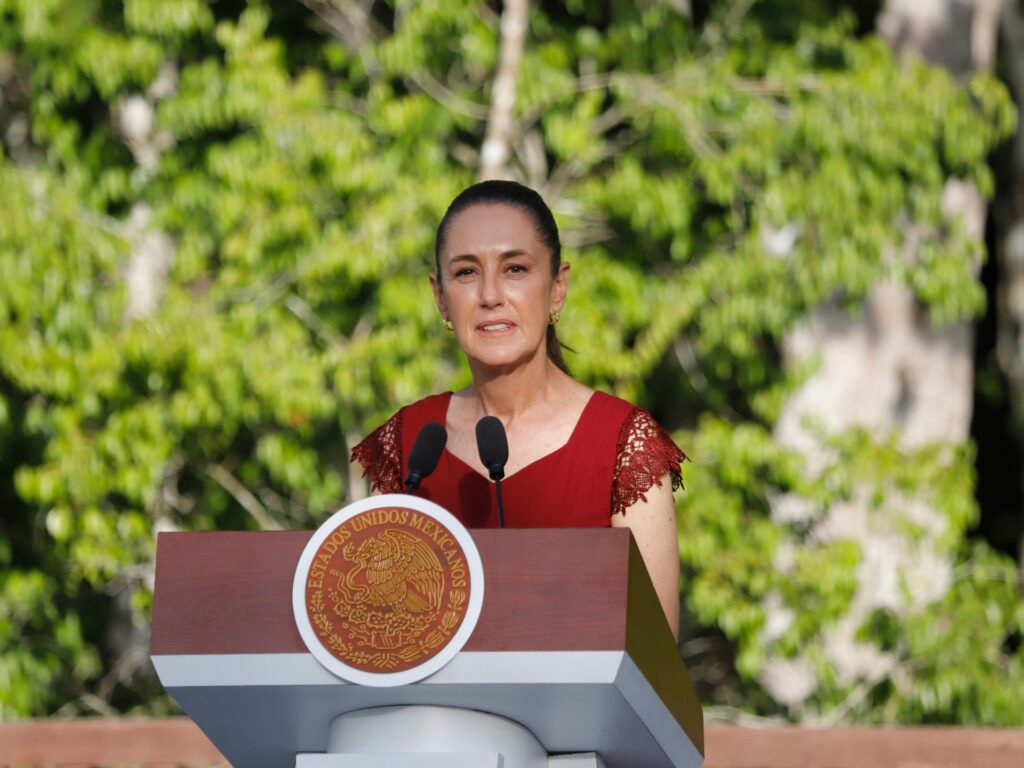Mexican President Claudia Sheinbaum has denied reports that her government is teaming up with the United States for a “major new initiative” to combat drug-trafficking cartels.
In her Tuesday morning news conference, Sheinbaum addressed the initiative, dubbed “Project Portero”, which was touted in the US as an effort to “strengthen collaboration between the United States and Mexico”.
The US Drug Enforcement Administration (DEA) had unveiled the initiative only one day prior.
“I want to clarify something. The DEA put out a statement yesterday saying that there is an agreement with the Mexican government for an operation called Portero,” Sheinbaum said.
“There is no agreement with the DEA. The DEA puts out this statement, based on what we don’t know. We have not reached any agreement; none of the security institutions [have] with the DEA.”
Sheinbaum emphasised that only her administration, not individual government agencies, would be announcing such an agreement on behalf of Mexico.
She also emphasised that the DEA needed to follow established protocols for making joint announcements.
Project Portero is part of an ongoing push under US President Donald Trump to stamp out cross-border drug trafficking and aggressively pursue the cartels and criminal networks that profit from such trade.
In its statement on Monday, the DEA called Project Portero its “flagship operation” aimed at shutting down drug-smuggling corridors along the border.
It described its partnership with Mexico as “a multi-week training and collaboration program” that would bring Mexican investigators together with US enforcement officials at an intelligence site on the southwest border.
Part of their task, the statement said, was to “identify joint targets” for the two countries to pursue.
“Project Portero and this new training program show how we will fight — by planning and operating side by side with our Mexican partners,” DEA administrator Terrance Cole said in the statement
“This is a bold first step in a new era of cross-border enforcement.”
But Sheinbaum said no such bilateral action was planned, though she speculated that the DEA might be referring to a small training exercise involving four Mexican police officers.
“The only thing we have is a group of police officers from the Secretariat of Citizen Security who were conducting a workshop in Texas,” she explained.
She did, however, point out that her government was actively working with the Trump administration to cement a border security agreement, based on mutual acknowledgements of sovereignty and respectful coordination.
Since taking office for a second term in January, Trump has repeatedly pressured the Sheinbaum government to stem the flow of immigrants and drugs across their countries’ shared border.
That includes through the threat of tariffs, a kind of tax imposed on imports. In late July, Trump announced he would keep tariffs on Mexican products at their current rate for 90 days.
Previously, he had threatened to hike the tariff rate to 30 percent on the basis that fentanyl was still reaching US soil.
“Mexico still has not stopped the Cartels who are trying to turn all of North America into a Narco-Trafficking Playground,” Trump wrote in a letter to Sheinbaum earlier that month.
Even with the 90-day pause, Mexico still faces a 25-percent tax — which Trump calls a “fentanyl tariff” — on all products that do not fall under the US-Mexico-Canada free trade agreement (USMCA).
Still, Trump has expressed warmth towards Sheinbaum, and the Mexican leader has largely avoided public confrontations with the US since taking office in October 2024.
Recently, Sheinbaum’s government coordinated with Trump’s to transfer 26 high-profile drug-trafficking suspects to the US for prosecution.
In February, she made a similar deal, sending 29 alleged cartel leaders from Mexican prisons to the US shortly before Trump threatened to impose tariffs on her country’s imports. It was Mexico’s largest prisoner transfer to the US in years.
But Sheinbaum has also faced scrutiny over her handling of Trump’s aggressive foreign policy platform.
Earlier this month, for instance, Trump’s State Department issued travel warnings for 30 of Mexico’s 32 states, warning Americans of “terrorist” activities in those areas.
Trump has also designated multiple Latin American criminal groups as “foreign terrorist organisations”, and he reportedly signed an order authorising military action to combat them.
Critics fear that order could translate into a military incursion on Mexican soil. But Sheinbaum has repeatedly downplayed those concerns, saying, “There will be no invasion of Mexico.”
Still, she has nevertheless asserted that any unauthorised US action on Mexican land would be considered a violation of her country’s sovereignty.
